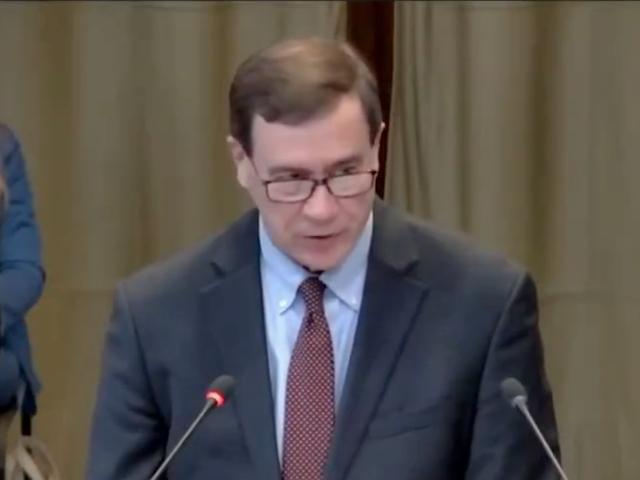In a recent and significant development, the United States has taken a firm stance in support of Israel's presence in Judea, Samaria (commonly referred to by the term coined by Jordan in 1951 as "the West Bank"), and East Jerusalem. This move comes in light of the International Court of Justice's (ICJ) consideration of a case that questions the legitimacy of Israel's presence in these areas. The case, prompted by a request from the United Nations General Assembly, seeks to challenge Israel's territorial claims following its victory over Jordan in the 1967 Six-Day War, a conflict that saw Israel gain control of these historically and strategically critical regions.
The backdrop to this legal scrutiny is a complex tapestry of historical events and geopolitical dynamics. Following the 1948 War of Independence, Jordan took control of Judea, Samaria, and East Jerusalem, expelling the Jewish populations residing there. Israel's refusal to participate in the current ICJ session underscores its view that the court's proceedings overlook crucial aspects of its rights and responsibilities, particularly its duty to safeguard its citizens and its inherent right to security. International law recognizes the acquisition of territory in a defensive war as legal, challenging the notion of these territories being under occupation. This perspective is bolstered by the absence of a Palestinian state movement prior to the 1960s, highlighting a significant historical oversight in the General Assembly's approach to this issue.
Here are some instructions to help the judges of Theatre of the Absurd a.k.a. the @CIJ_ICJ find the "occupied Palestinian territories."
— Maurice Hirsch, Adv. 🇮🇱 עו''ד מוריס הירש (@MauriceHirsch4) February 22, 2024
Go north of Narnia, east of Lilliput & just a quick right turn after Neverland.
When you get there, send us a postcard. pic.twitter.com/MPNJHOU8tx
The United States, through State Department official Richard Visek, articulated its position before the ICJ, emphasizing that the longstanding conflict between Palestinians and Israelis cannot be resolved through an advisory opinion that solely addresses the actions of one party. Visek highlighted the necessity of establishing an independent Palestinian state that coexists in peace and security alongside Israel, a vision that remains elusive amidst ongoing regional tensions. He critiqued the court's attempt to resolve the conflict unilaterally and underscored the importance of negotiations as the only viable path to a lasting peace.
Furthermore, Visek called on the UN court to adhere to the established peace framework, which aims for a comprehensive cessation of hostilities against Israel, rather than succumbing to pressures for Israel's immediate and unconditional withdrawal from the contested territories. The recent Hamas-led attacks on Israel serve as a stark reminder of the existential threats Israel faces, underscoring the critical nature of its security needs—needs that, according to Visek, have been largely ignored in the court's deliberations.
🇪🇬🇮🇱ICJ - ISRAEL ON TRIAL - EGYPT: "History will judge us for how we respond today."
— Mario Nawfal (@MarioNawfal) February 21, 2024
“There can be no prosperity, no security, no stability, no peace in the Middle East without upholding justice and the rule of law.” https://t.co/hGvosnhSnE pic.twitter.com/GI8dqgs8Yc
The Palestinian Foreign Minister, Riyad al-Maliki, appropriating the Zionist argument almost word-for-word, urged the court to recognize the Palestinians' "right to self-determination in their ancestral homeland" and to declare the Israeli presence in the territories as an illegal occupation that must end. However, this stance directly conflicts with the historical and legal nuances surrounding the issue of occupation and self-determination.
The concept of "Land for Peace" has been a pivotal element of U.S.-led diplomacy in the region, exemplified by the landmark Camp David agreement between Israel and Egypt. This diplomatic ethos underscores the complexity of achieving a durable peace in a region marked by deep-seated historical grievances and contemporary geopolitical challenges.
US to ICJ: Israel should not be forced to withdraw from Judea and Samaria' https://t.co/ax3k2CmovW דרך @ArutzSheva_En
— Israel Kicks A** (@Israelkicksass) February 22, 2024
The ICJ's involvement in this matter, highlighted by a controversial case brought by South Africa accusing Israel of genocide in Gaza, has brought these issues into sharp relief. The court's interim directive for Israel to take measures to prevent genocide underscores the international community's concern over the situation in Gaza.
Despite the Biden administration's critical stance on certain aspects of Israel's military operations, the United States continues to stand as Israel's most steadfast ally on the global stage. This enduring alliance is crucial as Israel navigates the intricate dynamics of regional politics and security concerns, especially in light of the civilian toll in the ongoing conflict.
MULTIMEDIA: photos and videos of today's hearing in the advisory proceedings on the Legal Consequences arising from the Policies and Practices of Israel in the Occupied Palestinian Territory, including East Jerusalem, are available here https://t.co/P9AgKm6NLE pic.twitter.com/GOGhcy1YAC
— CIJ_ICJ (@CIJ_ICJ) February 19, 2024
As the hearings draw to a close, the international community awaits the ICJ's advisory opinion, a nonbinding verdict that will nevertheless carry significant implications for the Israeli-Palestinian conflict and the broader quest for peace in the Middle East. The forthcoming decision, expected to take several months, will be a critical moment in the long history of this deeply entrenched conflict, reflecting the international legal community's perspective on one of the most contentious and consequential territorial disputes of our time.


